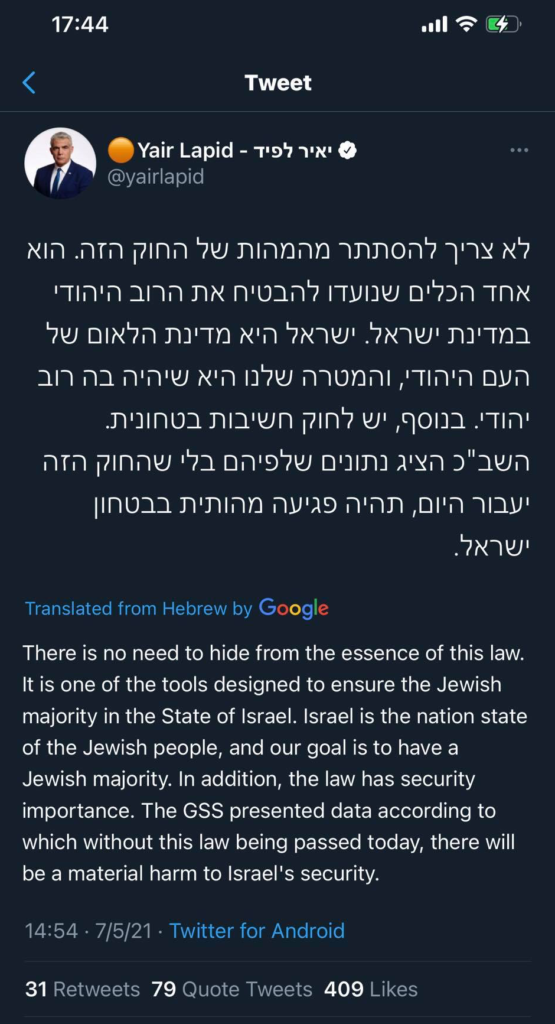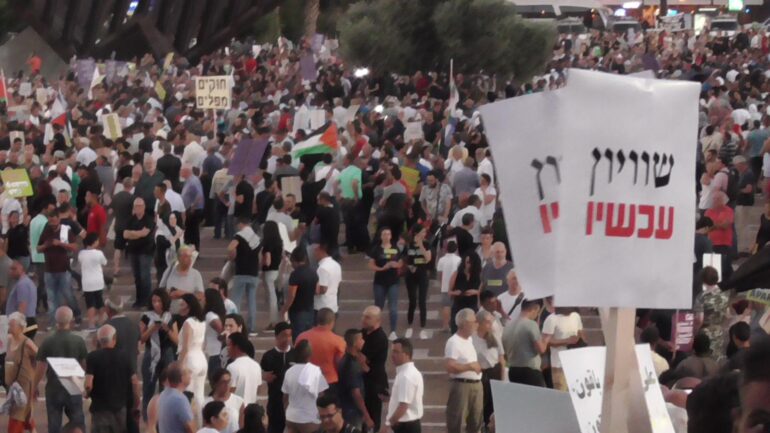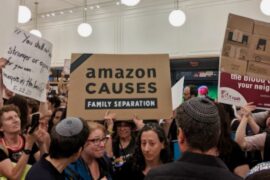The “Citizenship and Entry into Israel” law, which aimed to prevent the unification of Palestinian families across the Green Line, failed to pass a vote in the Knesset plenum early Tuesday morning.
59 lawmakers voted in favor of the bill, 59 voted against it, and two abstained.
At the last moment, the coalition turned the vote on the bill – also known as the Palestinian family reunification law – into a vote of confidence in the government.
Two members of the United Arab List voted against it, as did rebel Yamina lawmaker Amichai Chikli.
The current political crisis surrounding the renewal of the law is one of the clearest examples of the State of Israel’s failure to look towards the future and consider a bigger picture in our policy towards the Palestinians, Judea, Samaria, and Gaza.
The law, originally passed as a temporary order in 2003 during the Second Intifada, excludes Palestinians living in the West Bank and Gaza from receiving Israeli citizenship automatically upon marrying an Israeli citizen. Recent headlines surrounding the law have involved the refusal of two coalition factions – Meretz and the UAL – to vote in support of the law due to their principled disagreement with it (although a political compromise ultimately brought Meretz and half of UAL on board) and the refusal of various nationalist opposition parties to support the law out of a desire to bring down the “change government” of Prime Minister Naftali Bennett (Yamina) and Foreign/Alternative Prime Minister Minister Yair Lapid (Yesh Atid).
But neither side has been seriously engaging the larger questions that the law raises.
The law is presented by its proponents as a necessary measure to prevent terrorist elements in the West Bank and Gaza from gaining access to Israel through fraudulent marriages. It’s also presented as a necessary measure to maintain the State of Israel’s Jewish demographic majority. Its opponents point out that it is discriminatory against Palestinian citizens of Israel, who have family and friends across the Green Line, with no connections to any terror organizations. Furthermore, as advocates for Israel as a state of all its citizens, they see the rhetoric around “demographic threats” as racist.
But the elephant in the room that neither side is willing to touch is the core of the problem. The nation of Israel has been experiencing a major identity crisis for the last half century. The Israeli public isn’t sure if it wants to be a modern Western nation-state – an outpost of Western civilization – or if it wants to be a Jewish state that indigenizes back into the Semitic region. We can’t decide if “democratic” (often a synonym for “Western” in Israel) or “Jewish” is the guiding principle of our social and political vision for the country.

That dilemma has, among many other issues, prevented Israel from taking concrete steps in either direction regarding the territories that we gained in the Six Day War. Successive governments have waffled between relinquishing half the country to establish a Palestinian state and annexing the territories to become fully integrated parts of the state. The same questions of security and demography that shaped the reunification law have animated this uncertainty for decades.
The coalition plans to try passing the law again but it’s ultimately irrelevant whether or not they succeed. If the bill passes, issues of security and demography will continue to rear their heads – as recent months have proven, the physical fences that divide 48 Palestinians from 67 Palestinians can do little to disrupt the solidarity between the populations. As long as a common identity continues to motivate Palestinians in Gaza to launch rockets in solidarity with Palestinians in Jerusalem, and Palestinians in Lod to riot in solidarity with Palestinians in Gaza, no reunification law will clean up the issues of security and demography that have become so foundational in Israel’s political rhetoric.
Similarly, if the law doesn’t pass, Palestinians will not find themselves suddenly able to gain Israeli citizenship – the interior ministry and the national security establishment will make sure to prevent Palestinians from gaining Israeli citizenship without a legal basis, just as they have for the last two decades with the law behind them.
Such laws only serve as temporary bandages to the much larger structural issues facing Israeli society. We ultimately need to open our eyes and look to the future to truly address these major questions about the direction in which Israel is headed. Without a recognition of the Palestinian attachment to – and solidarity across – all of historic Palestine, we have no hope for creating a stable solution.
And without replacing our Western representative “democracy” with a more participatory and localized system of governance that makes demography less of a threat, we have no chance to move beyond the narrow dehumanizing rhetoric that reduces a whole population to “demographic threats” and “security concerns.”
So, as the politicians continue to bicker away, we must find ways to fundamentally challenge the status quo that their irrelevant laws purport to maintain, in order to advance a radical model of governance that can manifests our people’s oldest and dearest ideals.





